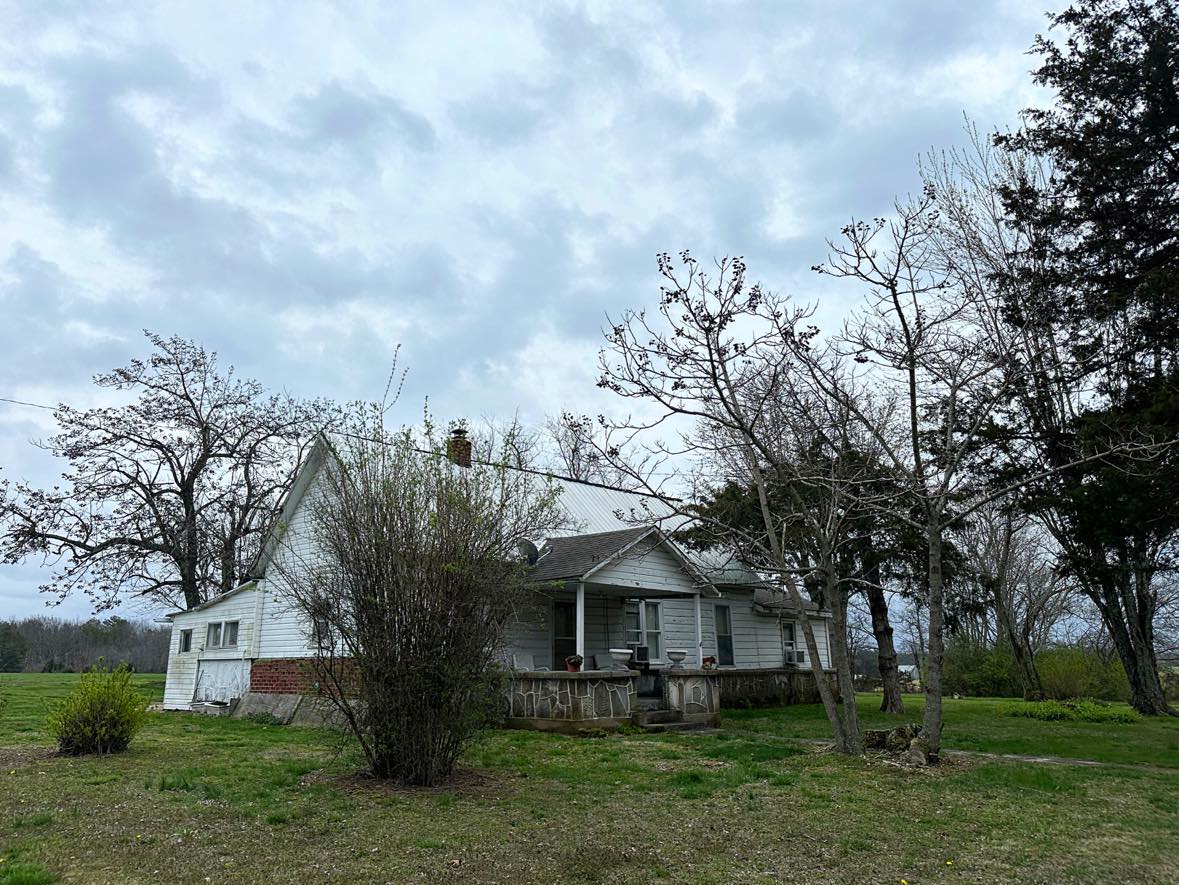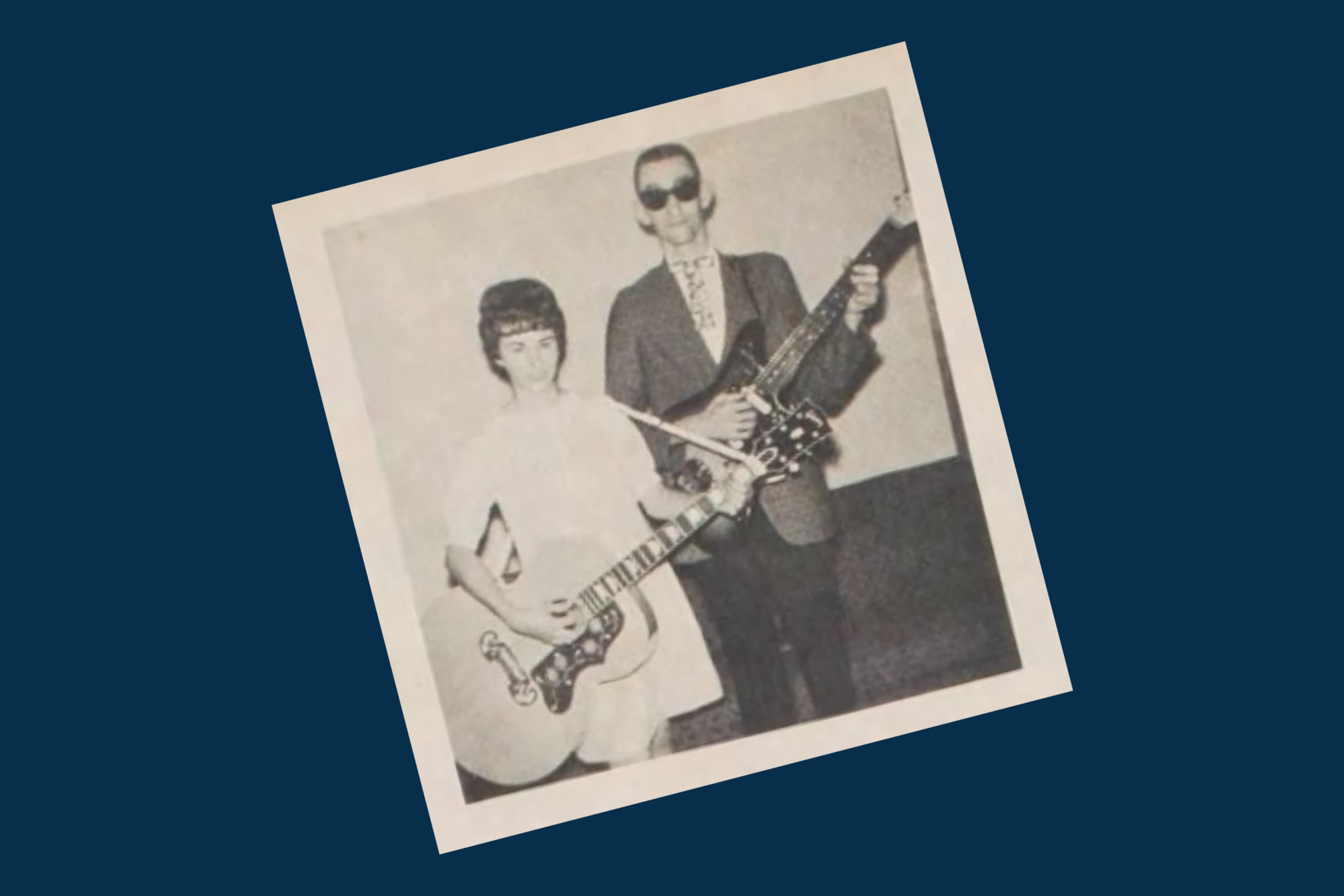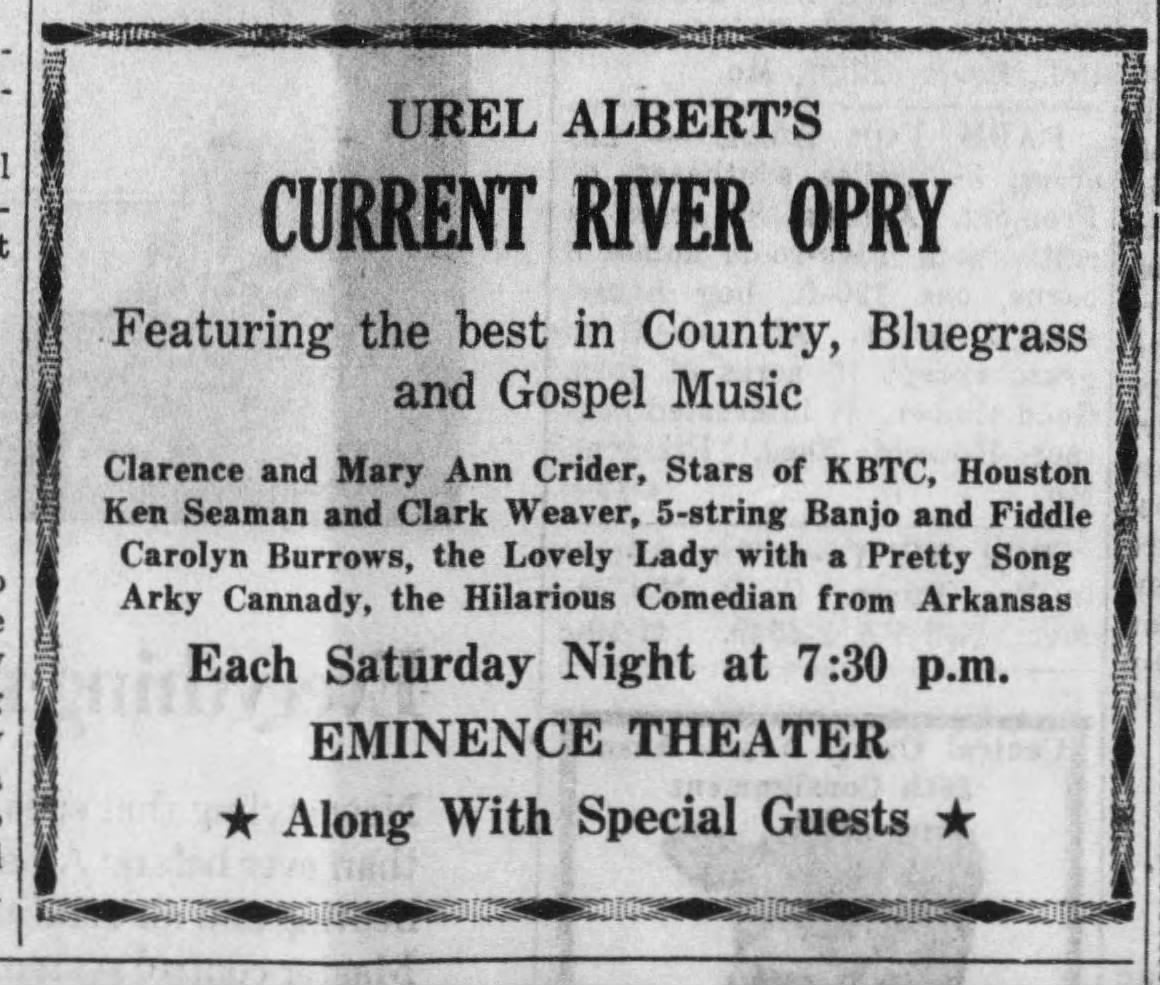This story is published in partnership with Ozarks Alive, a cultural preservation project led by Kaitlyn McConnell.

SUMMERSVILLE — If the walls of the little white house could talk, they would sing.
They heard good music for a good many years as the place where Clarence and Mary Ann Crider practiced and picked. The brother-and-sister duo’s talent — hers primarily as a singer, and his as a songwriter, guitarist and banjo picker — led them to play across the region for around 50 years.
It’s an impressive feat on its own, but even more so given that Clarence, 89 this month, is blind and has been for most of his life.
In the late '60s, the Criders' talent got them to Nashville. They even had the chance to go on the road and potentially make it big on a new level. But personal conviction led them back home to the Ozarks and the house where their family moved in 1944.
It’s also where today they still oversee a weekly radio show that began in 1963. In March, “The Clarence and Mary Ann Crider Show” marked 60 years on the air.
Looking back
Mary Ann’s hands were much younger when she first opened the door on that little house in rural Shannon County.
“I’ve been here in this house since I was two years old,” the 80-year-old said of the place her parents bought for $800 and brought their young family to. Back then, it only had three rooms — a kitchen, living room and bedroom — but its layout has expanded with time.
Their father, Clyde, did a number of jobs to support the family, including some farming, sawmill work, laying rock, construction and work with the highway department.
“Whatever he could find to make money,” said Clarence.

In addition to Mary Ann and Clarence, the siblings have a brother who lives in St. Charles.
The death of another brother as an infant was a tragic blow for the family, which also faced Clarence’s blindness in the mid-1930s. He was a young child when he contracted Impetigo, a skin infection that spread to his eyes.
“Back then, (people) always laid their kids right on the bed,” said Mary Ann of a visitor to the family’s home, who placed her baby near Clarence. “I think three or four days later, Clarence got to breaking out, and it got in his eyes.
“Back then, there wasn’t no doctors here much and so they had to take him to Rolla. By that time, they said his eyesight’s already gone.”
“They thought I was gonna die,” adds Clarence. “By the time they got me well, the stuff they put in put my eyes out.”
It was a reality reflected in the local newspaper: “We regret to hear of the serious condition of the small son of Mr. and Mrs. Clyde Crider, near Summersville,” wrote the Oak Ridge columnist in the Houston Herald in November 1935. “We hope to hear of an early improvement.”
Unfortunately, Clarence’s sight never returned.
While perhaps the norm in those days, the Criders’ mother stayed home on account of Clarence’s blindness. “She was always here to help us kids,” her daughter said.
Clarence was about 10 years old when they moved to the house where he now sits, but he was in his late teens before he lived there full-time. As a child, he went to St. Louis to attend the Missouri School for the Blind.
“I didn’t go for a long time, and finally they made me go, and it was the best thing I ever done because I got my education,” said Clarence, who took the bus from nearby Raymondville to St. Louis to attend school.
He spent around six years at school, coming home for time at Christmas and over summer vacation. The rest of his days were spent learning skills to help him navigate life in a sightless world. Braille was one skill he acquired.
Another was how to play guitar.
“They just taught me chords and stuff, but then I went and picked up a lot more,” said Clarence, who got his first guitar when he was a teenager.
“My grandma bought me my first guitar. She come down and I said, ‘I’d like to have a guitar,’ and Mom and Dad didn’t have the money to buy me one. She said, ‘You buy a guitar and send me the bill for it.’”
Mary Ann, too, loved music — “I kept up with all the hit songs,” she said. “If it was a hit song, I learned that song” — but she shares that a foundation of their love was deeper than simply what sounded good.
“Mom and Dad always kept us in church,” said Mary Ann. “They found out they were starting a little church down here — we didn’t think we were rich enough to go to the town church — so we got started at the little country church down here.
“We just always took Jesus into our heart and he’s been a friend of ours all these years.”
In addition to faith, church also gave a place to begin playing music.
“We got started in church – that’s how we got our music started,” said Mary Ann. “We got started going to a Pentecost church, so we got to taking our guitars along and playing with them.”
That love set the stage for a big moment in their lives: In 1963, the brother and sister — then both in their 20s — began a weekly radio show on KBTC out of nearby Houston.
Six decades later, it’s still on the air.
The program has changed with time — it’s now on KUKU out of Willow Springs, where it’s been since 1974 — but six decades later, the Gospel-music program still sings from the airwaves every Sunday morning.
“I always wanted to be on the radio,” said Clarence, who grew up listening to programs like the Grand Ole Opry. “I got me enough sponsors to pay the bill (and) we started a radio show in March 1963. We’re celebrating 60 years.”
Extending through the region
The show’s start was part of a busy era for the Criders.
In 1966, three years after the radio show began, Clarence and Mary Ann were asked to perform as part of the Current River Opry. The summer show — originally held in Van Buren, the headquarters for the then-newly formed Ozark National Scenic Riverways — grew to a weekly show that lasted for many years.
By the end of the decade, the brother and sister were also recording music in Nashville — but not together. While Clarence wrote songs Mary Ann sang, he didn’t actually perform on the recordings.
“We weren’t in the union so we had to use their musicians,” said Mary Ann.
The Criders’ success garnered news coverage in their hometown newspaper, which told of goings-on in Nashville.
“Miss Crider has recorded two songs for the Spar Record Company, Nashville, Tenn. Her brother has written two songs which were recorded in Nashville by Urel Albert,” praised the Houston Herald newspaper in 1969. “Mary Ann’s first record was released this week on The Tennessee Jamboree label. Songs on both sides of the record, entitled ‘Everything But Love’ and ‘I’ll Be True,’ were composed by her brother.”

Two other songs Clarence wrote that received significant attention were “Saturday Night in Nashville” and “The American Dream,” the Criders said, and that the latter was performed internationally on the American Forces Network, a station for U.S. military based overseas.
“I could type — I could write 60 words a minute on a typewriter. When I was going to school they taught us to do that,” said Clarence. “So I’d type the words out, and then I’d show them how the tune went.”
However, striving for greater stardom wasn’t what the Criders ultimately wanted for their lives.
“We made four records in Nashville, and they said, ‘We want to put you with a booking agent,” says Clarence.
“They liked me real well, but they said, ‘You’re going to have to hit the road and go to beer joints, taverns, stuff like that,” said Mary Ann. “I said, ‘I wasn’t raised like that.’”
“He’s like, ‘What? They’re the ones with the money to pay you with,’” continued Clarence. “‘You’re not well-known enough to draw a crowd on your own. You’ve got to go where the crowd’s at.’
“We said, ‘Well, we don’t believe in that because we’re religious.’
“He said, ‘You might as well go home. If you won’t play where they sell liquor, you don’t got no job.’”
They came home to the Ozarks, to Summersville and to the same house where they still live, and continued building a local presence playing music.
“I didn’t plan on getting saved. I planned on going to Nashville and being a country musician,” said Clarence, who became a Christian when he was 17 in a pickup truck at a brush arbor meeting. “The Lord came along and changed my plans.”
Current River Opry
Even though they weren’t headed across the country, the Criders were traversing the Ozarks.
Multiple news clippings tell of Mary Ann’s presence on “The Slim Wilson Show,” a TV program out of Springfield that evolved from the “Ozark Jubilee.” The duo regularly performed at events throughout the Ozarks, including benefits and even at Walmart stores during special events.
“Back then, you could about pick up and play anywhere,” said Mary Ann. “We might not have got rich, but we made some money.
“Back then you could live a little better on a little amount than you can now.”
And, for around 45 years, they were found at the Current River Opry.
“We had a stage we all stood on. Come up and sing our songs, get big hands, have an intermission, sell our stuff — we didn’t have anything to sell for a long time,” said Mary Ann. “I’d go around and talk to everybody and go back, get me a soda, and go back up and do our requests.”

After the initial show ended in Van Buren, it moved to Eminence. That was where it was in 1973 when it was the focus of a feature story in the St. Louis Post-Dispatch about the Ozarks music scene.
Unfortunately, the Criders were away the night the reporter visited the Opry — “The Criders were playing at a dance in Arkansas,” he wrote — but the article painted a picture of the weekly events, which drew both locals and tourists:
“Current River Opry … is indicative of something larger in the life of Eminence in particular and the Ozarks in general. In a way, every day is country music day in Eminence — not necessarily Country with a capital ‘C,’ not Nashville commercial country with electric guitars and white Cadillacs, but the lower-case country that’s part of growing up in the Missouri Ozarks, carrying your guitar to school to play during lunch hour or picking out a Gospel song on a mandolin at the Rev. Lloyd Welch’s Sunday evening worship service down at the Assembly of God Church.”
It was a mix of locals and tourists who attended the show, driving from places like Salem and Houston, and even Illinois.
“We’d have college kids come down to the Current River Opry and, I’m telling you, they were the cheeringest bunch of kids you ever saw,” said Mary Ann. “We really loved that.
“We was nobody but they really made out like we were.”
After the Eminence Theater burned down, the show moved to Summersville’s VFW building. That’s where it remained until 2010, when the Criders decided it was time to retire.
Continuing the music
That decision wasn’t because they became tired of music. It was time, found through age and reality. Clarence was injured in a fall two years prior, breaking his neck and causing numbness in his fingers.
“We retired from everything except our radio program,” said Clarence. “We kept doing it because we like to do it.”
Church remained central to their lives and was a place they continued to play. In the past, Clarence preached and served in a pastoral role, his dedication to faith seen through a cabinet full of Bibles in Braille.
Mary Ann takes one of the large bound books — Isaiah — off the shelf. At one time, Clarence used them to read. Now, the numbness in his fingers makes that difficult, too. And another fall around a year ago made the situation even more complicated.
“We’re gonna go until the end of this year; we have a contract until the end of this year,” Clarence said of the radio program. “And then when the year is up, we’ll decide. Our health’s getting pretty bad so we may quit, or we may go another year. I don’t know what we’ll do.”
The Criders record the segments from their home, which are taken over in batches to the radio station. “Sometimes we get requests; sometimes we pick out songs we like,” said Clarence of the content, which largely focuses on Gospel music.
“We started out on reel-to-reel tape,” said Clarence. “Finally the radio station said, ‘We aren’t going to buy any more reel-to-reel tapes; you’re going to have to go to cassette.’ So we went to cassette tape. Then finally they said, ‘We aren’t going to buy any more cassette tapes, you’ll have to go to CDs.’ So we went to CD. We make our own recordings; make our own stuff. So we’re still on CDs, but they went to computers. But the guy at the radio station takes them off CD and puts them on the computer so they can broadcast it.”
They currently aren’t making many new programs — “I’ve got about 50 radio shows made up, so I just pick one out and send it,” said Clarence — but their commitment to having content on air continues.
“We went to the radio station last week and took them over 10 shows,” added Mary Ann. “When those run, why, we’ll take them over some more.”
The Criders mention their sponsors, which have long helped make the show possible.
“The main one is a bank. Our bank up here — they’ve sponsored us since 1965,” said Clarence, naming others. “We’ve got a funeral home — we’re going to need that before too long.”
“We don’t worry about making a lot of money — just so we can pay the bills,” said Mary Ann. “It’s more of a hobby. It’s something we started out with years ago, so we’re just trying to keep things a’going.”
“The Clarence and Mary Ann Crider Show” airs on KUKU 100.3 FM at 8:30 on Sunday mornings. It may be streamed online at KUKU's website.


